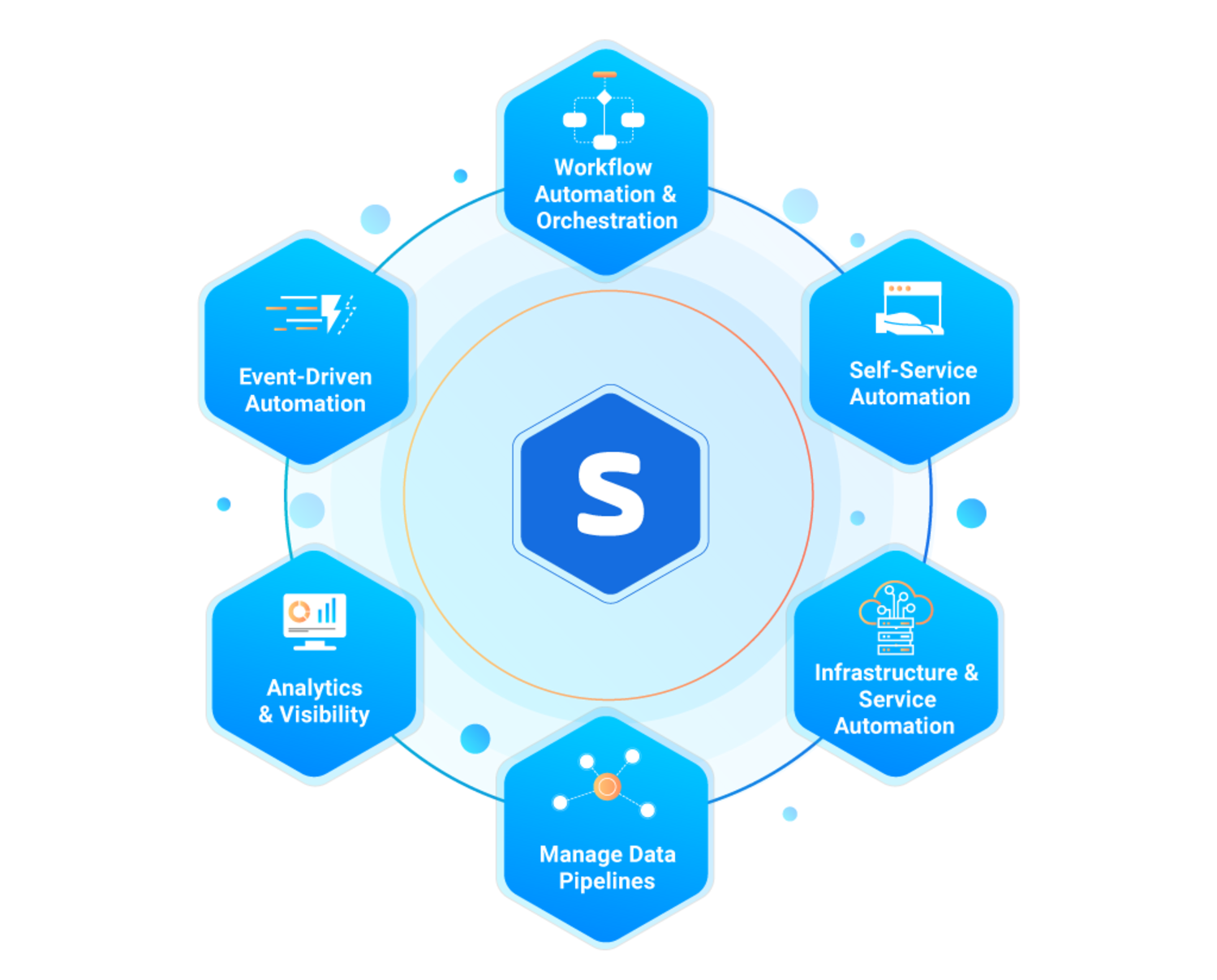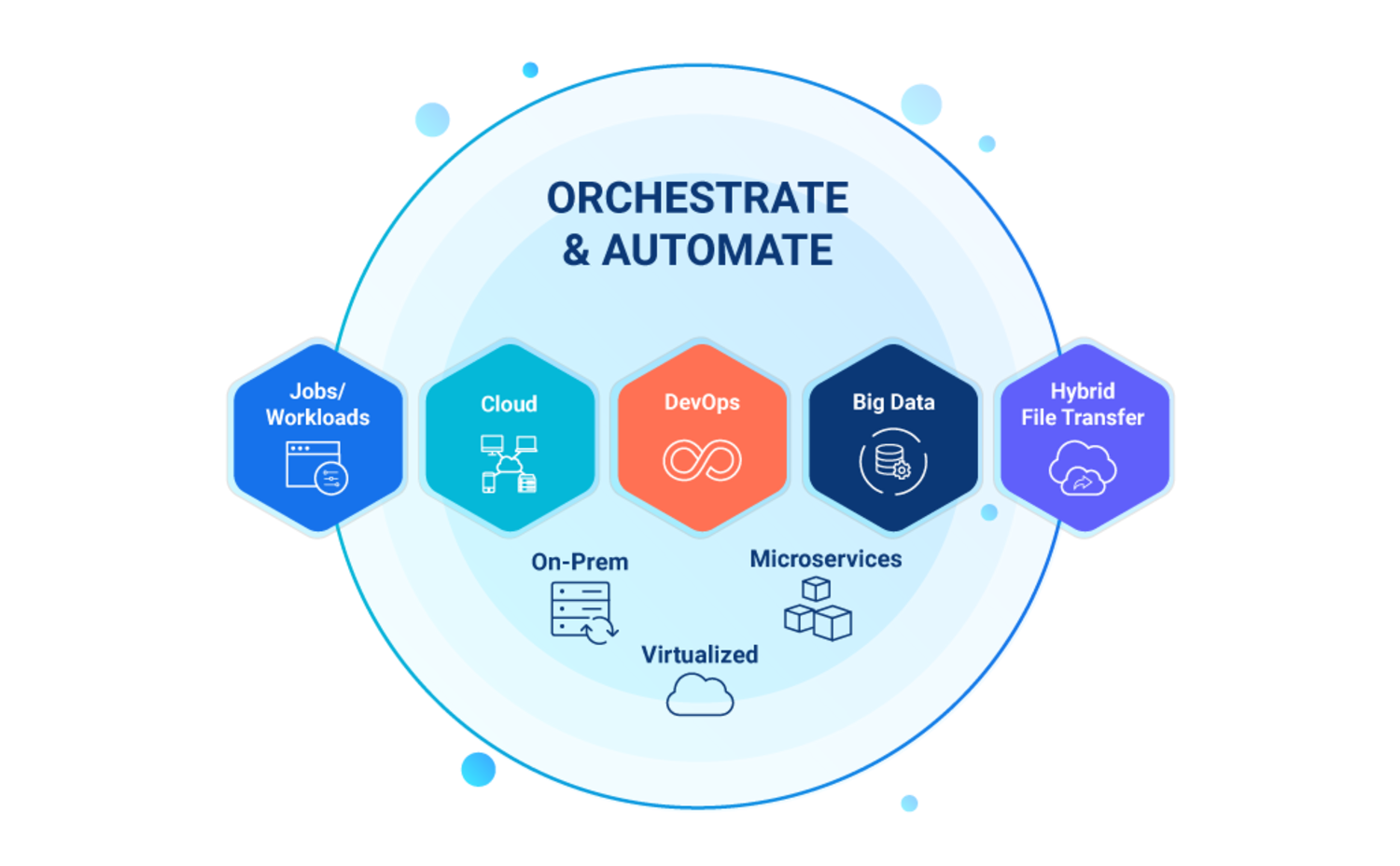Five Key Solutions within the Universal Automation Center Platform
What does the Universal Automation Center platform really do? Hint, way more than job scheduling. This primer is for anybody interested in taking full advantage of the platform’s powerful real-time hybrid IT orchestration and automation capabilities.

The IT automation market has shifted dramatically over the decades. What started as batch processing has evolved into job scheduling, and then to workload automation, and now most recently, to what Gartner has coined as a service orchestration and automation platform. The change in automation category names is not something to be taken lightly. Rather, it is representative of the seismic shifts in what, when, and how IT processes can be automated.
Regardless of how the industry categorizes the Stonebranch Universal Automation Center (UAC), there are several practical solution areas that organizations use our platform to support. This article serves as a primer for anybody interested in the platform's capabilities and how enterprises are leveraging Stonebranch to help orchestrate and automate their business today.
What is the Stonebranch Universal Automation Center?
Stonebranch builds IT orchestration and automation solutions that help enterprises break down automation silos while centralizing control of automated jobs, tasks, and workloads. The UAC platform supports your entire hybrid IT environment, including on-premises, cloud, and containerized microservices. The platform runs automation in real-time, responds intelligently to business needs, and integrates with just about any application or platform you can throw at it.
Speaking of integration, connecting with your platform and application ecosystem is paramount to using the Universal Automation Center. Only by connecting the dots between systems can an enterprise truly achieve workflow orchestration across the business.
Pillars of Orchestration and Automation within the UAC
Made up of six primary pillars, the UAC is designed to help IT Ops teams scale to meet business demands.

Event-Driven Automation: The UAC automates IT processes in real-time. The event-based approach launches tasks, jobs, and workflows based on system triggers that can happen at any time. The outcome is automation in the moment, versus legacy batch and time-based job scheduling software approaches - which the UAC also supports.
Workflow Automation and Orchestration: Within the platform, enterprises can visually design workflows that span across any environment. The platform features low or no-code drag-and-drop capabilities and helps enterprises connect the dots between applications or platforms.
Self-Service Automation: This is where you can create what we like to call Citizen Automators. The platform uses access controls via member groups to customize the experience for DevOps, Data Analysts, and really any business user group like finance or HR. The UAC also uses what we call up-stream integrations, which allow end-users to kick off and view the status of workflows directly from within tools like ServiceNow, Slack, and Microsoft Teams.
Infrastructure and Service Automation: With UAC, you can create, start, stop, terminate, monitor, and alter both on-prem and cloud infrastructures. Plus, many of our customers like the platform's ability to empower end-users, like DevOps, with self-service provisioning via infrastructure-as-code capabilities.
Manage Data Pipelines: Automate the flow of data between disparate applications and platforms via native managed file transfer capabilities. Data movement is highly secure, and the platform is designed to transfer data within your internal environment or externally with 3rd party partners and vendors.
Analytics and Visibility: Within the platform, you have a command-center style set of views that provide alerts, dashboards, SLA monitoring, and much more. This includes the ability to customize views by individual end-users and member groups.
Five Key Solutions Within the Universal Automation Center Platform
Within the Universal Automation Center Platform, we have several key solution areas. The focus is to provide an expandable and future proof solution where you can automate and orchestrate anything you need from a single platform. Let us dive into a few of our key solutions.

1. Jobs / Workloads: The UAC has firm roots as a workload automation tool. With the solution, you can centrally build, schedule, and manage all IT tasks and business processes across your hybrid environment.
2. Cloud: In addition to on-prem, the UAC platform is made to manage cloud automation within a single cloud, hybrid cloud, or multi-cloud environments. With this solution, you can centrally orchestrate jobs and workloads, allowing you to manage workflows across your hybrid environment from a single platform. Of course, this is in addition to the platform's ability to support both on-prem mainframes and servers.
Fun Fact: The ability to automate highly orchestrated workflows across a hybrid IT environment is a key reason many organizations decide to leverage the Universal Automation Center platform.
3. DevOps: Automate your DevOps lifecycle, connecting the dots between tools to support a CI/CD pipeline. You can empower developers with automated workflows to 3rd party source control systems, like GitHub, using jobs-as-code. Plus, developers can use self-service to spin up infrastructure in the cloud with infrastructure-as-code.
4. Big Data: Centralize the automated jobs required to support your end-to-end big data processes. This includes data collection, automating ETL solutions like Informatica, automating data tools like Hadoop, and automating the distribution of analytic and dashboard solutions like Tableau or SAP BusinessObjects. To be clear, the UAC is not designed to replace your big data tech stack. Instead, with strong integration capabilities, the UAC replaces disparate custom scripts and native job schedulers with a centralized approach to keep data moving and quickly root-cause issues.
5. Hybrid File Transfer: Combining our event-based trigger approach with manage file transfer capabilities, you can securely move data internally or between third party solutions in real-time. File transfer plays a crucial role in supporting your evolution to the cloud and keeping data in sync between disparate systems.
Fun fact: As part of a digital transformation initiative, many clients move data between on-premises mainframes or servers and their cloud service providers. One interesting feature to support this use case is UAC's ability to automate Red Hat Openshift and Docker containers.
Summary
Cost savings and efficiency gains are still significant, as they have always been with more traditional automation tools. However, the UAC goes further with real-time workflows that drive business agility and digital innovation. Enterprises use the UAC to create new value streams, both internally and customer-facing.
Start Your Automation Initiative Now
Schedule a Live Demo with a Stonebranch Solution Expert





